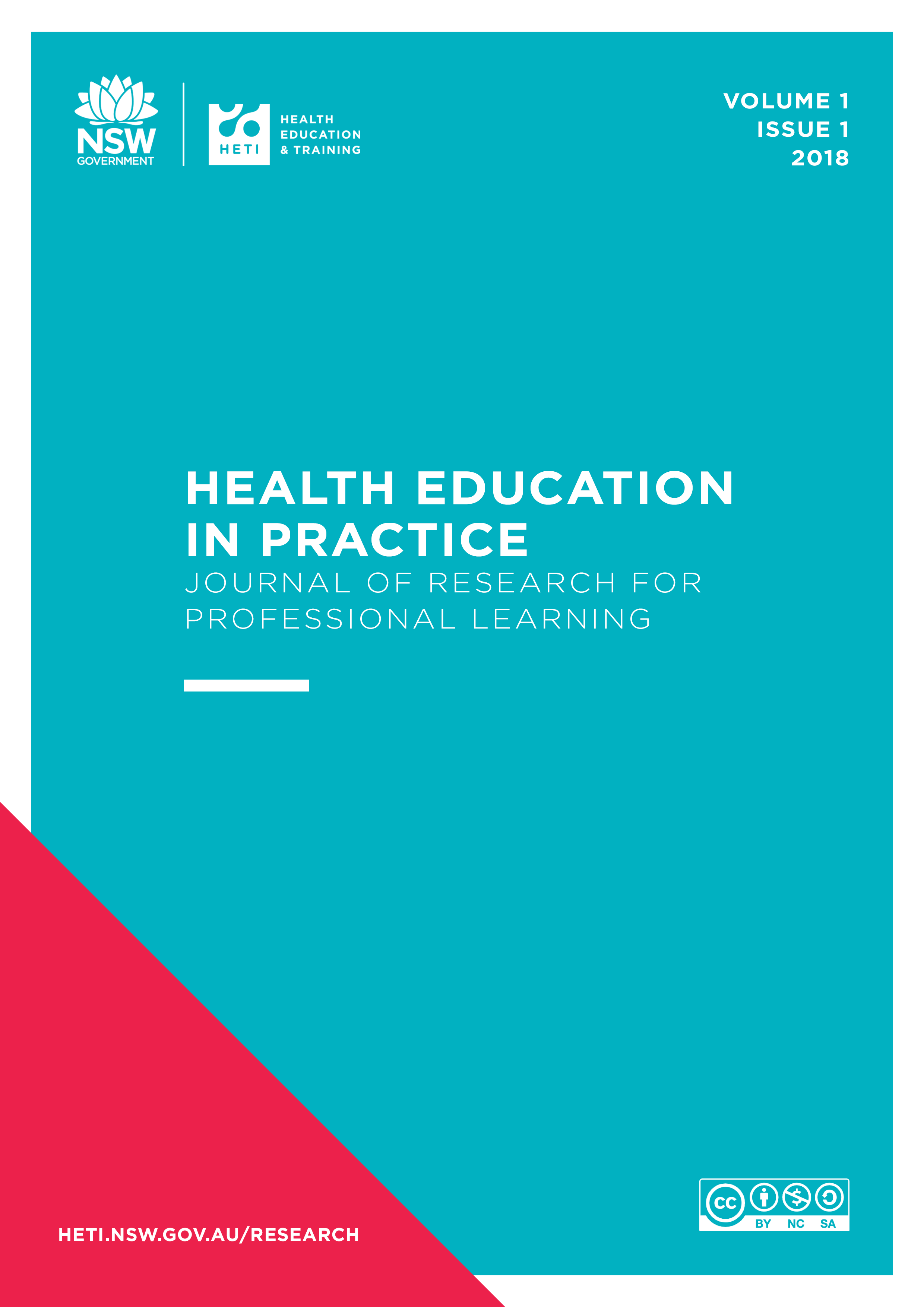The CASE Methodology: A guide to developing clinically authentic case-based scenarios for online learning programs targeting evidence-based practice
Abstract
18 June 2018 Corrigendum: It has come to the attention of the Editorial Team that an error in the article by Shaw et al (2018) was published. Following publication, the authors notified that an author’s name was incorrectly spelt (Nicole Henenka). The correct spelling is: Nicole Heneka.
Correct article details:
'The CASE Methodology: A guide to developing clinically authentic case-based scenarios for online learning programs targeting evidence-based practice' by Tim Shaw, Anna Janssen, Stewart Barnet, James Nicholson, Jennifer Avery, Nicole Heneka, Jane Phillips, published in Health Education in Practice: Journal of Research for Professional Learning, Volume 1, Issue 1, 2018.
Introduction: Online learning has become an increasingly common means of delivering healthcare professional education. Case-based scenarios are the foundation of many continuing professional development (CPD) activities. No framework currently exists to ensure the development of quality, evidence-based cases despite the weighted importance case-based scenarios have on improving participant learning. The aim of the project was to develop a systematic framework for generating evidence-based case-based scenarios for learning.
Methodology: A literature review was conducted to determine whether a case development framework or resources currently existed, of which few were found. The authors’ previous experiences and lessons learnt in developing case-based scenarios was integrated into the framework. Adult learning theory and evidence from the literature was also applied in the framework development process.
Results: A framework that entailed a systematic approach to developing evidence-based case scenarios was developed, called the CASE methodology. This framework ensures a Collaborative approach to developing Authentic and Succinct case scenarios that are founded on the Embedding best available evidence.
Conclusion: The CASE framework is a concise approach to developing quality case studies that are grounded on evidence. The CASE methodology could be easily applied to CPD development in many contexts to improve the overall consistency and quality of case scenarios for learning.
Downloads
References
Nutley S, Walter I, Davies HT: From knowing to doing: a framework for understanding the evidence-into-practice agenda. Evaluation 2003, 9(2):125-148.
Browman GP, Snider A, Ellis P: Negotiating for change. The healthcare manager as catalyst for evidence-based practice: changing the healthcare environment and sharing experience. HealthcarePapers 2003, 3(3):10-22.
Grol R, Grimshaw J: From best evidence to best practice: effective implementation of change in patients' care. The lancet 2003, 362(9391):1225-1230.
Sandars J, Heller R: Improving the implementation of evidence‐based practice: a knowledge management perspective. Journal of evaluation in clinical practice 2006, 12(3):341-346.
Curran VR, Fleet L: A review of evaluation outcomes of web‐based continuing medical education. Medical education 2005, 39(6):561-567.
Ryan G, Lyon P, Kumar K, Bell J, Barnet S, Shaw T: Online CME: an effective alternative to face-to-face delivery. Medical teacher 2007, 29(8):e251-e257.
Shaw T, Long A, Chopra S, Kerfoot BP: Impact on clinical behavior of face‐to‐face continuing medical education blended with online spaced education: A randomized controlled trial. Journal of Continuing Education in the Health Professions 2011, 31(2):103-108.
Janssen A, Shaw T, Bradbury L, Moujaber T, Nørrelykke AM, Zerillo JA, LaCasce A, Robinson T, Starr A, Harnett P: A mixed methods approach to developing and evaluating oncology trainee education around minimization of adverse events and improved patient quality and safety. BMC medical education 2016, 16(1):91.
Kerfoot BP, Brotschi E: Online spaced education to teach urology to medical students: a multi-institutional randomized trial. The American Journal of Surgery 2009, 197(1):89-95.
Shaw T, Barnet S, Mcgregor D, Avery J: Using the Knowledge, Process, Practice (KPP) model for driving the design and development of online postgraduate medical education. Medical teacher 2015, 37(1):53-58.
Manns PJ, Darrah J: A structured process to develop scenarios for use in evaluation of an evidence-based approach in clinical decision making. Advances in medical education and practice 2012, 3:113.
Jiwa M, Halkett G, Meng X, Pillai V, Berg M, Shaw T: Supporting patients treated for prostate cancer: a video vignette study with an email-based educational program in general practice. Journal of medical Internet research 2014, 16(2).
Robinson T, Janssen A, Kirk J, DeFazio A, Goodwin A, Tucker K, Shaw T: New approaches to continuing medical education: a QStream (spaced education) program for research translation in ovarian cancer. Journal of Cancer Education 2017, 32(3):476-482.
Phillips JL, Heneka N, Hickman L, Lam L, Shaw T: Impact of a novel online learning module on specialist palliative care nurses’ pain assessment competencies and patients’ reports of pain: results from a quasi-experimental pilot study. Palliative medicine 2014, 28(6):521-529.
Shaw TJ, Pernar LI, Peyre SE, Helfrick JF, Vogelgesang KR, Graydon-Baker E, Chretien Y, Brown EJ, Nicholson JC, Heit JJ: Impact of online education on intern behaviour around joint commission national patient safety goals: a randomised trial. BMJ Qual Saf 2012, 21(10):819-825.
Bruckel J, Carballo V, Kalibatas O, Soule M, Wynne KE, Ryan MP, Shaw T: Use of spaced education to deliver a curriculum in quality, safety and value for postgraduate medical trainees: trainee satisfaction and knowledge. Postgraduate medical journal 2016:postgradmedj-2015-133446.
Agarwal PK, Karpicke JD, Kang SH, Roediger HL, McDermott KB: Examining the testing effect with open‐and closed‐book tests. Applied cognitive psychology 2008, 22(7):861-876.
Vlach HA, Sandhofer CM: Distributing learning over time: The spacing effect in children’s acquisition and generalization of science concepts. Child development 2012, 83(4):1137-1144.
Reeves TC, Herrington J, Oliver R: Authentic activities and online learning. 2002.
Cercone K: Characteristics of adult learners with implications for online learning design. AACE journal 2008, 16(2):137-159.
Heckman R, Annabi H: A content analytic comparison of learning processes in online and face-to-face case study discussions. Journal of Computer-Mediated Communication 2005, 10(2):JCMC10210.
Aviv R, Erlich Z, Ravid G, Geva A: Network analysis of knowledge construction in asynchronous learning networks. Journal of Asynchronous Learning Networks 2003, 7(3):1-23.
Aviv R, Erlich Z, Ravid G: Cohesion and roles: Network analysis of CSCL communities. In: Advanced Learning Technologies, 2003 Proceedings The 3rd IEEE International Conference on: 2003: IEEE; 2003: 145-149.
Fraser S, Matthews S: The critical practitioner in social work and health care: Sage; 2007.

